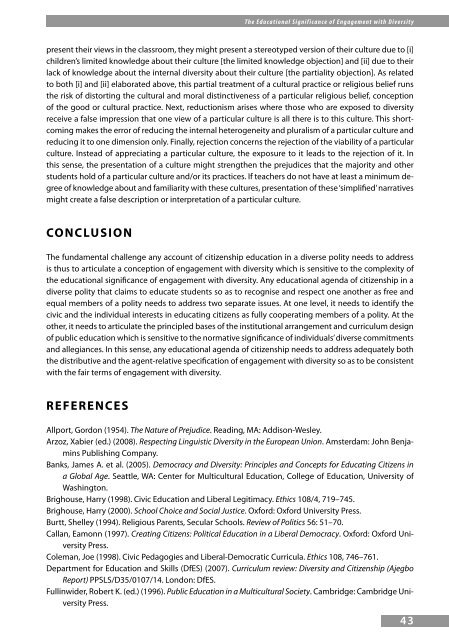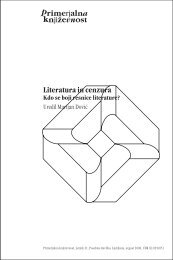Mitja SARDOČNext, the idea of an educational environment characterized by a ‘discont<strong>in</strong>uous ethos’ (Brighouse,1998) or the idea of the ‘detached school’ (Lev<strong>in</strong>son, 1999) offer<strong>in</strong>g an ideal educational environmentwhere the development and the exercis<strong>in</strong>g of the three basic capacities for engagement with diversitywould be carried out faces a twofold risk, as it fails to take <strong>in</strong>to consideration the possibility that pupilsmight be negatively affected <strong>in</strong> their families and their social environment. On the one hand, it canalienate students com<strong>in</strong>g from a non-dom<strong>in</strong>ant m<strong>in</strong>ority group from the shared public values and theircommitment to the basic <strong>in</strong>stitutional framework of a diverse polity [the challenge of alienation]. On theother hand, as the experiences and perspectives that constitute one’s core commitments are not widelyshared by other students, one can turn out to be disproportionately disadvantaged [the challenge ofcognitive dissonance].I ma<strong>in</strong>ta<strong>in</strong> that both the ideal of the detached school as a policy proposal of common education aswell as the pedagogical strategy of imag<strong>in</strong>ative engagement are likely to create a disproportionate disadvantagefor those students whose foundational beliefs or conceptions of the good are not part of thema<strong>in</strong>stream or can depart from the shared public values of a diverse polity. Moreover, the developmentand the exercis<strong>in</strong>g of the capacity for critical reflection can result <strong>in</strong> the weaken<strong>in</strong>g of the bond<strong>in</strong>g tiesof <strong>in</strong>dividuals with their communities and do not necessarily lead to the bridg<strong>in</strong>g capital of engag<strong>in</strong>gwith others. Neither critical reflection nor imag<strong>in</strong>ative engagement, I ma<strong>in</strong>ta<strong>in</strong>, are sufficiently sensitiveto the issue of distance identified above. Furthermore, the development and exercis<strong>in</strong>g of the capacityfor reflective distance can result <strong>in</strong> a detachment from one’s constitutive commitments and allegiancesand therefore jeopardize both the ma<strong>in</strong>tenance of cultural coherence and personal <strong>in</strong>tegrity. Moreover,the model of the detached school is likely to disproportionately disadvantage those students whosefoundational beliefs depart from the shared public values or prevail<strong>in</strong>g norms of a society. It jeopardizesthe personal <strong>in</strong>tegrity of students and the cultural coherence of their communities.In the case of exposure of diversity, students com<strong>in</strong>g from an ethical environment or an ethnoculturalgroup that is not part of the ma<strong>in</strong>stream are disproportionately disadvantaged compared to thosethat are part of the ma<strong>in</strong>stream. Those children represent<strong>in</strong>g the majority will be <strong>in</strong> a privileged positioncompared to those who come from a m<strong>in</strong>ority position s<strong>in</strong>ce the first position is the ‘normal’ one. Forexample, if I present myself <strong>in</strong> front of a group of students who f<strong>in</strong>d my own experience – for whateverreason – unfamiliar, I am likely to experience an <strong>in</strong>tegrity-based asymmetry. As some proponents ofmulticulturalism view emphasise (e.g. Parekh, 2000), the regime-level pr<strong>in</strong>ciples and <strong>in</strong>stitutional structuresof a liberal democratic society unfairly exclude m<strong>in</strong>ority groups and religious associations from itsbasic structure. As he states,liberals are not and perhaps cannot be liberal <strong>in</strong> all areas of life, and enterta<strong>in</strong> and live by nonliberal ideas, amixture of liberal and nonliberal ideas, or even by <strong>in</strong>st<strong>in</strong>cts, faith and habits <strong>in</strong> matters relat<strong>in</strong>g to <strong>in</strong>timate <strong>in</strong>terpersonalrelations, moral values, ethnic, political or national loyalties, and religious beliefs (Parekh 2000: 241).The vulnerability of students who are not part of the ma<strong>in</strong>stream is therefore disproportionately moreburdensome compared to those students who are part of the ma<strong>in</strong>stream. In other words, this argumenthas led to <strong>in</strong>sensitivity to the other part of engagement with diversity, lead<strong>in</strong>g to an asymmetrybetween those expos<strong>in</strong>g themselves and those who benefit from this exposure.Epistemic shortcom<strong>in</strong>gsThere are three epistemic shortcom<strong>in</strong>gs that can arise with both the exposure to diversity view and exposureof diversity, i.e. [i] stereotyp<strong>in</strong>g; [ii] reductionism; and [iii] rejection. Let us exam<strong>in</strong>e each <strong>in</strong> turn.The shortcom<strong>in</strong>g of stereotyp<strong>in</strong>g concerns examples where a particular trait of character or characteristicsof diversity becomes generalised. For example, if students from a dist<strong>in</strong>ctive cultural background42
The Educational Significance of Engagement with Diversitypresent their views <strong>in</strong> the classroom, they might present a stereotyped version of their culture due to [i]children’s limited knowledge about their culture [the limited knowledge objection] and [ii] due to theirlack of knowledge about the <strong>in</strong>ternal diversity about their culture [the partiality objection]. As relatedto both [i] and [ii] elaborated above, this partial treatment of a cultural practice or religious belief runsthe risk of distort<strong>in</strong>g the cultural and moral dist<strong>in</strong>ctiveness of a particular religious belief, conceptionof the good or cultural practice. Next, reductionism arises where those who are exposed to diversityreceive a false impression that one view of a particular culture is all there is to this culture. This shortcom<strong>in</strong>gmakes the error of reduc<strong>in</strong>g the <strong>in</strong>ternal heterogeneity and pluralism of a particular culture andreduc<strong>in</strong>g it to one dimension only. F<strong>in</strong>ally, rejection concerns the rejection of the viability of a particularculture. Instead of appreciat<strong>in</strong>g a particular culture, the exposure to it leads to the rejection of it. Inthis sense, the presentation of a culture might strengthen the prejudices that the majority and otherstudents hold of a particular culture and/or its practices. If teachers do not have at least a m<strong>in</strong>imum degreeof knowledge about and familiarity with these cultures, presentation of these ‘simplified’ narrativesmight create a false description or <strong>in</strong>terpretation of a particular culture.CONCLUSIONThe fundamental challenge any account of citizenship education <strong>in</strong> a diverse polity needs to addressis thus to articulate a conception of engagement with diversity which is sensitive to the complexity ofthe educational significance of engagement with diversity. Any educational agenda of citizenship <strong>in</strong> adiverse polity that claims to educate students so as to recognise and respect one another as free andequal members of a polity needs to address two separate issues. At one level, it needs to identify thecivic and the <strong>in</strong>dividual <strong>in</strong>terests <strong>in</strong> educat<strong>in</strong>g citizens as fully cooperat<strong>in</strong>g members of a polity. At theother, it needs to articulate the pr<strong>in</strong>cipled bases of the <strong>in</strong>stitutional arrangement and curriculum designof public education which is sensitive to the normative significance of <strong>in</strong>dividuals’ diverse commitmentsand allegiances. In this sense, any educational agenda of citizenship needs to address adequately boththe distributive and the agent-relative specification of engagement with diversity so as to be consistentwith the fair terms of engagement with diversity.REFERENCESAllport, Gordon (1954). The Nature of Prejudice. Read<strong>in</strong>g, MA: Addison-Wesley.Arzoz, Xabier (ed.) (2008). Respect<strong>in</strong>g L<strong>in</strong>guistic Diversity <strong>in</strong> the European Union. Amsterdam: John Benjam<strong>in</strong>sPublish<strong>in</strong>g Company.Banks, James A. et al. (2005). Democracy and Diversity: Pr<strong>in</strong>ciples and Concepts for Educat<strong>in</strong>g Citizens <strong>in</strong>a Global Age. Seattle, WA: Center for Multicultural Education, College of Education, University ofWash<strong>in</strong>gton.Brighouse, Harry (1998). Civic Education and Liberal Legitimacy. Ethics 108/4, 719–745.Brighouse, Harry (2000). School Choice and Social Justice. Oxford: Oxford University Press.Burtt, Shelley (1994). Religious Parents, Secular Schools. Review of Politics 56: 51–70.Callan, Eamonn (1997). Creat<strong>in</strong>g Citizens: Political Education <strong>in</strong> a Liberal Democracy. Oxford: Oxford UniversityPress.Coleman, Joe (1998). Civic Pedagogies and Liberal-Democratic Curricula. Ethics 108, 746–761.Department for Education and Skills (DfES) (2007). Curriculum review: Diversity and Citizenship (AjegboReport) PPSLS/D35/0107/14. London: DfES.Full<strong>in</strong>wider, Robert K. (ed.) (1996). Public Education <strong>in</strong> a Multicultural Society. Cambridge: Cambridge UniversityPress.43
- Page 1 and 2: 36 2012Inštitut za slovensko izsel
- Page 3 and 4: 36 • 2012IzdajaInštitut za slove
- Page 5 and 6: VSEBINA / CONTENTSTEMATSKI SKLOP /
- Page 7: T E M A T S K I S K L O PMigration
- Page 10 and 11: Mirjam MILHARČIČ HLADNIKdo vedno
- Page 12 and 13: Mirjam MILHARČIČ HLADNIKZame je b
- Page 14 and 15: Mirjam MILHARČIČ HLADNIKres zarad
- Page 16 and 17: Mirjam MILHARČIČ HLADNIKMoj razis
- Page 18 and 19: Mirjam MILHARČIČ HLADNIKVsi smo v
- Page 20 and 21: Mirjam MILHARČIČ HLADNIKPajnik, M
- Page 22 and 23: Olga DEČMAN DOBRNJIČ, Milan PAGON
- Page 24 and 25: Olga DEČMAN DOBRNJIČ, Milan PAGON
- Page 26 and 27: Olga DEČMAN DOBRNJIČ, Milan PAGON
- Page 28 and 29: Olga DEČMAN DOBRNJIČ, Milan PAGON
- Page 30 and 31: Olga DEČMAN DOBRNJIČ, Milan PAGON
- Page 32 and 33: Olga DEČMAN DOBRNJIČ, Milan PAGON
- Page 34 and 35: Olga DEČMAN DOBRNJIČ, Milan PAGON
- Page 36 and 37: Mitja SARDOČENGAGEMENT WITH DIVERS
- Page 38 and 39: Mitja SARDOČPart of the difficulty
- Page 40 and 41: Mitja SARDOČsion and would advance
- Page 42 and 43: Mitja SARDOČexposure of students t
- Page 46 and 47: Mitja SARDOČGaleotti, Anna Elisabe
- Page 49 and 50: VKLJUČENOST VSEBIN VEČKULTURNEGAI
- Page 51 and 52: Vključenost vsebin večkulturnega
- Page 53 and 54: Vključenost vsebin večkulturnega
- Page 55 and 56: Vključenost vsebin večkulturnega
- Page 57 and 58: Vključenost vsebin večkulturnega
- Page 59: Vključenost vsebin večkulturnega
- Page 62 and 63: Irena LESAR, Ivana ČANČAR, Anita
- Page 64 and 65: Irena LESAR, Ivana ČANČAR, Anita
- Page 66 and 67: Irena LESAR, Ivana ČANČAR, Anita
- Page 68 and 69: Irena LESAR, Ivana ČANČAR, Anita
- Page 70 and 71: Irena LESAR, Ivana ČANČAR, Anita
- Page 72 and 73: Irena LESAR, Ivana ČANČAR, Anita
- Page 74 and 75: Irena LESAR, Ivana ČANČAR, Anita
- Page 76 and 77: Marijanca Ajša VIŽINTINUVOD 1Za
- Page 78 and 79: Marijanca Ajša VIŽINTINrij, ki ne
- Page 80 and 81: Marijanca Ajša VIŽINTINV številn
- Page 82 and 83: Marijanca Ajša VIŽINTINstora z en
- Page 84 and 85: Marijanca Ajša VIŽINTIN272) pouda
- Page 86 and 87: Marijanca Ajša VIŽINTINHuddleston
- Page 89: R A Z P R A V E I N Č L A N K IE S
- Page 92 and 93: Drago KOSslovenske muslimanske skup
- Page 94 and 95:
Drago KOSna javno in zasebno sfero,
- Page 96 and 97:
Drago KOSseveda ni mogoče izogniti
- Page 98 and 99:
Drago KOSin fizičnih sporočil, ki
- Page 100 and 101:
Drago KOSskih cerkva. V predstavlje
- Page 102 and 103:
Drago KOSSmrke, Marjan, Hafner-Fink
- Page 104 and 105:
Špela KALČIĆINTRODUCTIONWest Afr
- Page 106 and 107:
Špela KALČIĆsues. While some hav
- Page 108 and 109:
Špela KALČIĆlost my job. Next ye
- Page 110 and 111:
Špela KALČIĆin temporary jobs in
- Page 112 and 113:
Špela KALČIĆtions. The mobility
- Page 114 and 115:
Špela KALČIĆlimits the possibili
- Page 116 and 117:
Špela KALČIĆethnic transnational
- Page 118 and 119:
Špela KALČIĆCasado-Diáz, María
- Page 121 and 122:
LIVEABOARDS IN THE MEDITERRANEAN: L
- Page 123 and 124:
Liveaboards in the Mediterranean: L
- Page 125 and 126:
Liveaboards in the Mediterranean: L
- Page 127 and 128:
Liveaboards in the Mediterranean: L
- Page 129 and 130:
Liveaboards in the Mediterranean: L
- Page 131 and 132:
Liveaboards in the Mediterranean: L
- Page 133 and 134:
DIPLOMAT KOT AKTER IN OBJEKT MIGRAC
- Page 135 and 136:
Diplomat kot akter in objekt migrac
- Page 137 and 138:
Diplomat kot akter in objekt migrac
- Page 139 and 140:
Diplomat kot akter in objekt migrac
- Page 141 and 142:
Diplomat kot akter in objekt migrac
- Page 143:
Diplomat kot akter in objekt migrac
- Page 146 and 147:
Marko KLAVORAali Edina Mujčina, 2
- Page 148 and 149:
Marko KLAVORAKo sem pisal prispevek
- Page 150 and 151:
Marko KLAVORASAŠO: Oboje. Nekateri
- Page 152 and 153:
Marko KLAVORAonalizem, vse to so me
- Page 154 and 155:
Marko KLAVORAosebno, je rekel: »Ni
- Page 156 and 157:
Marko KLAVORAsangvinis. 17 Ko jih b
- Page 159 and 160:
DUNAJČANKA V LJUBLJANI: MEDKULTURN
- Page 161 and 162:
Dunajčanka v Ljubljani: Medkulturn
- Page 163 and 164:
Dunajčanka v Ljubljani: Medkulturn
- Page 165 and 166:
Dunajčanka v Ljubljani: Medkulturn
- Page 167 and 168:
Dunajčanka v Ljubljani: Medkulturn
- Page 169 and 170:
Dunajčanka v Ljubljani: Medkulturn
- Page 171:
K N J I Ž N E O C E N EB O O K R E
- Page 174 and 175:
Book ReviewsSodobni bošnjaški na
- Page 176 and 177:
Book Reviewspolitičnih ceremonijah
- Page 179 and 180:
Poročilo s 17. Posveta slovenskih
- Page 181 and 182:
NAVODILA AVTORJEM ZA PRIPRAVO PRISP
- Page 183 and 184:
INSTRUCTIONS TO AUTHORS PREPARINGAR
- Page 185:
36 2012Inštitut za slovensko izsel
















